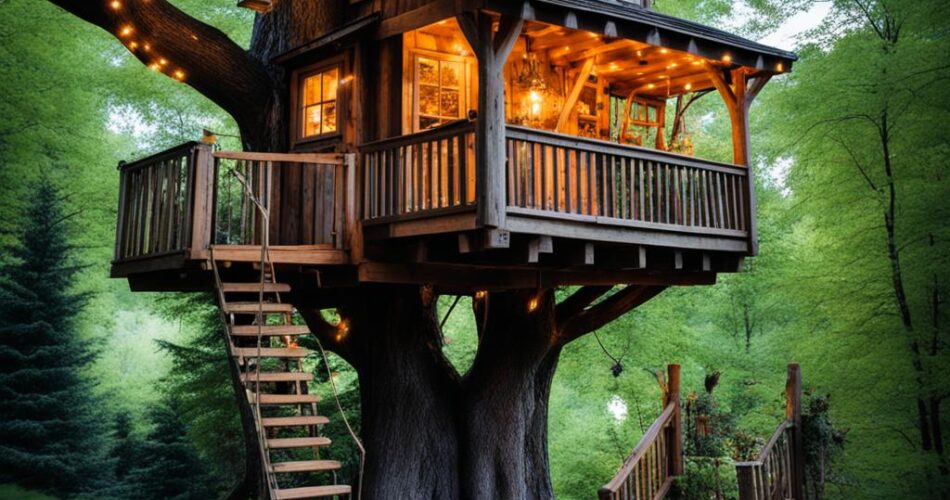Treehouses transform into luxurious retreats. From rustic cabins to modern hideaways, backyard treehouses offer endless possibilities.
DIY treehouses become popular homeowner projects. Plans on Pinterest make construction accessible with pressure-treated lumber.
Professional builders like With Bear Hands craft bespoke treehouses. They incorporate string lights, spiral staircases, repurposed windows.
Key Takeaways
- Treehouses offer unique retreats for kids and adults
- Designs range from rustic to modern and fairytale styles
- DIY treehouse kits and plans make backyard builds accessible
- Professional companies craft luxury, custom treehouses
- Eco-friendly materials and repurposed elements enhance designs
Treehouse Ideas: A Gateway to Childhood Wonder
Treehouses transport us to carefree childhood days. Their allure unleashes boundless creativity. Whimsical backyard treehouses offer imaginative play structures. Possibilities are endless for the family.
Rustic Childhood Retreats
Envision a treehouse bungalow nestled in branches. Walls adorned with rough-hewn wood shingles. Roof topped with charming cedar shakes. These rustic treehouses exude inviting ambiance.
Crafted using sustainable pressure-treated lumber, they provide safe retreats. Children can let imaginations soar.
- Classic A-frame designs with climbing ladders and rope swings
- Cozy lofts with built-in seating and reading nooks
- Whimsical details like stained glass windows and hand-carved accents
Imaginative Play Structures
Truly extraordinary treehouse experiences are limitless. Imagine a nature-inspired Victorian-style treehouse. Bold black accents, peaked roof with intricate detailing. Whimsical charm creates fairy tale atmosphere.
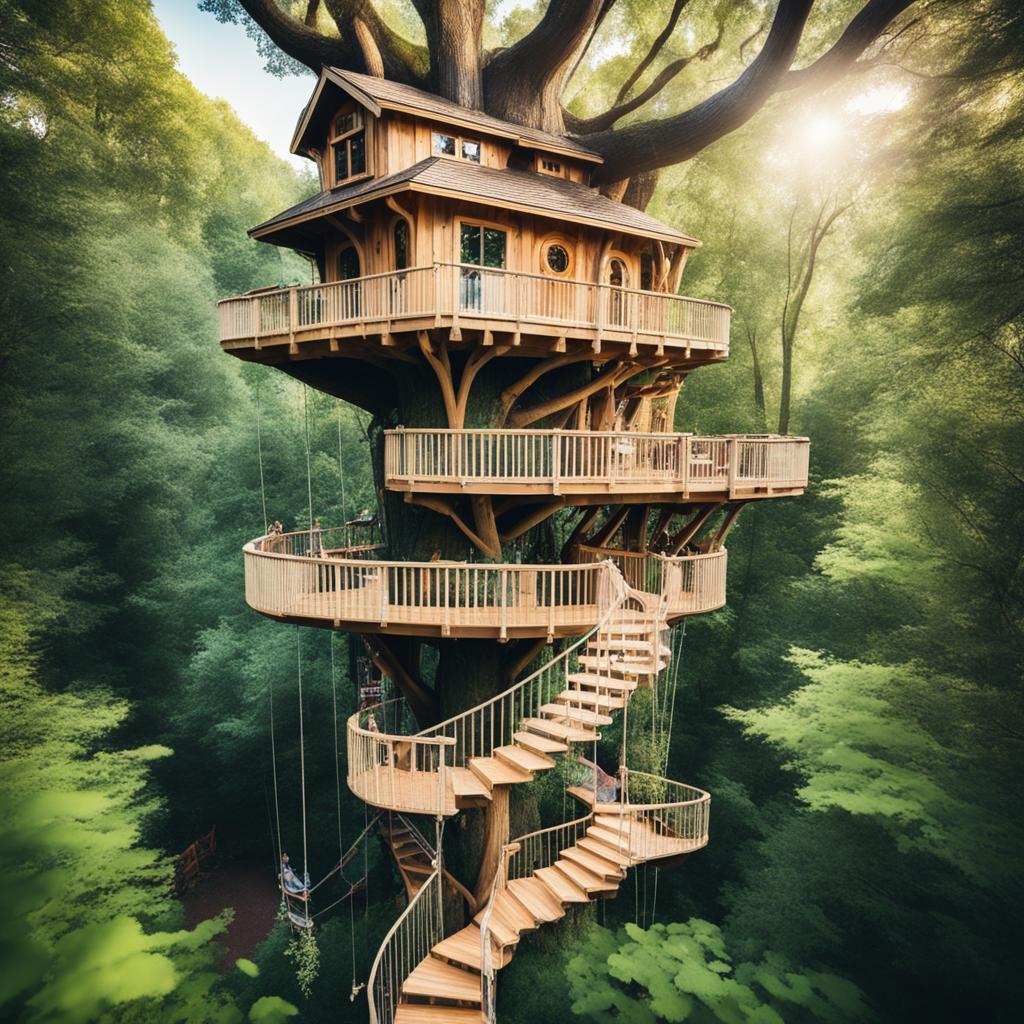
These play structures incorporate wobbly rope bridges, climbing walls, zip wires. Treehouses become exhilarating playgrounds. Premium-grade Cedar and copper turrets make them visually stunning, durable.
Treehouses foster creativity, problem-solving skills, nature connection. Creating lasting memories ignites childhood wonder in all.
Choosing the Perfect Treehouse Tree
Building a treehouse is magical. Selecting the right tree is crucial. Not all trees support a treehouse. Consider tree health, stability, species, and size.
Tree Health and Stability
A healthy tree with robust roots and sturdy trunk is needed. Examine for disease, insect infestations, or wildlife issues. Consult an arborist to assess overall health and stability. Ensure it can withstand treehouse weight and stress.
Suitable Tree Species
- Oak trees are excellent choices.
- Maple and beech trees are suitable.
- Fir and hemlock may need support.
- Avoid brittle willow or boxelder trees.
Ideal Tree Size
The tree should have a 12-inch trunk diameter. This distributes weight through secure attachment points. Consider height; children’s treehouses should be under 10 feet. This reduces fall injury risks.

Treehouses nurture childhood wonder and imagination. They create lasting outdoor memories. Choosing the right tree ensures safety and enjoyment. Consider health, species, and size for a magical retreat.
Designing Your Dream Treehouse
A well-designed treehouse blends functionality, whimsy, and appeal. Whether a cozy retreat or architectural marvel, treehouse design ideas ignite imagination, transforming outdoor spaces.
Your dream treehouse’s purpose determines layout and amenities. Is it a playful outdoor play area for kids, an adult escape, or unique guest accommodation?
Children’s treehouses incorporate slides, swings, climbing structures for imaginative play and adventure. Adult retreats have cozy seating, built-in bookcases, outdoor kitchens or bars.
Aesthetic Appeal and Inspiration
Draw inspiration from nature’s beauty, embracing organic materials like wood, stone, rope for rustic feels. Or opt for sleek, modern lines.
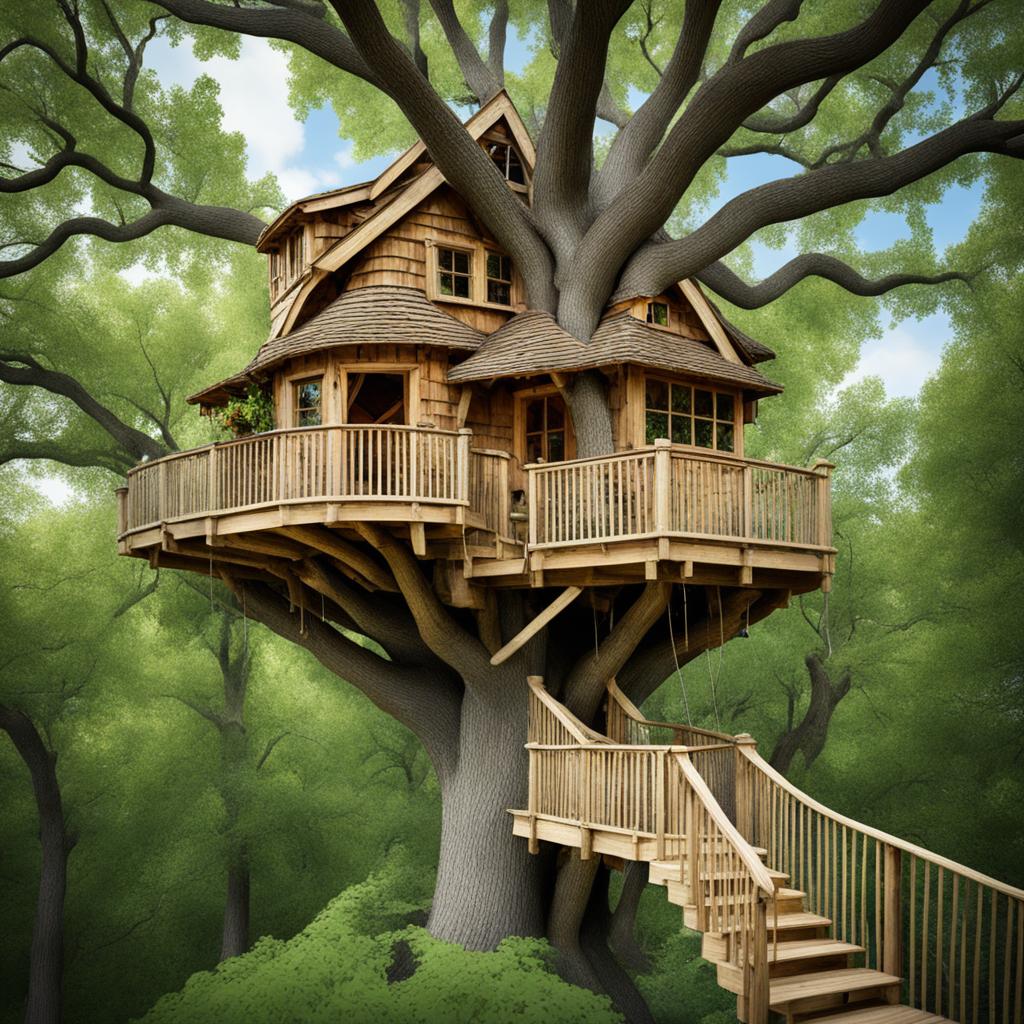
Let your treehouse design reflect personality – a whimsical fairy-tale castle, pirate ship among branches, or futuristic pod suspended in canopy.
Treehouses reconnect with nature, embracing wonder and adventure at any age.
Simple and serene or grand and fantastical, thoughtful treehouse design ideas create magical backyard oases reflecting dreams, bringing joy.
Safety First: Treehouse Construction Tips
Beginning a treehouse project is exciting. However, treehouse safety should be your top priority. Neglecting proper treehouse safety guidelines can lead to potential dangers. It’s crucial to approach treehouse construction plans with great care.
Here are some essential treehouse building tips for a safe, secure hideaway.
- Seek professional guidance from an arborist or structural engineer to assess the tree’s health and stability, ensuring it can support the weight of your dream treehouse.
- Use specialized treehouse attachment bolts (TABs) or lag bolts for a secure foundation that won’t harm the tree.
- Install sturdy railings and barriers around open edges, adhering to local building codes and safety regulations.
- Consider building a 3D, to-scale cardboard model to evaluate your design’s feasibility and identify potential safety concerns before construction.
The treehouse platform bears the weight of the structure and occupants. Invest in high-quality anchors, bolts, and hardware for robust platform construction. If building higher in a mature tree, use fixed cables or restraining hardware for added soundness and stability.
Safety gear, such as protective gloves, eyewear, hi-vis jackets, hard hats, and safety harnesses, is essential for minimizing risks during treehouse construction. Additionally, keeping a well-stocked first aid kit on hand can be invaluable in case of emergencies.
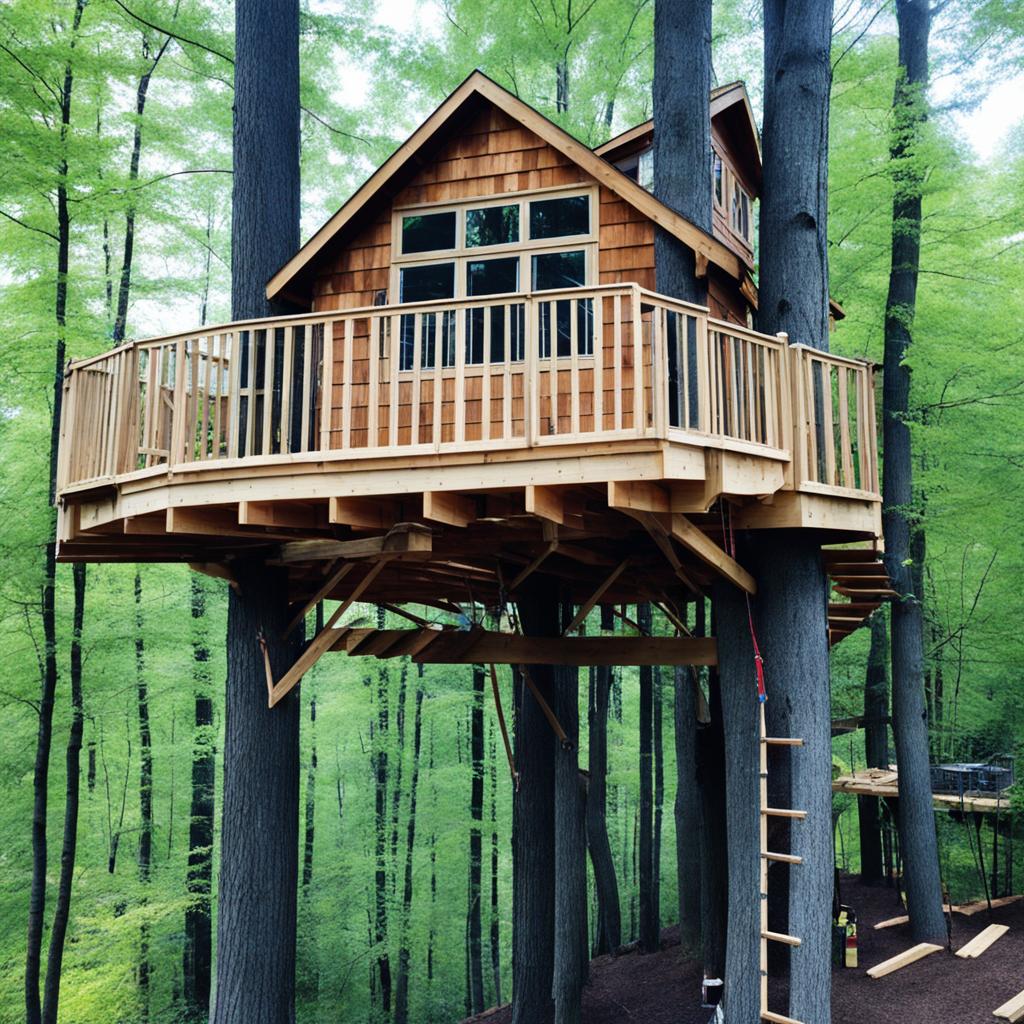
While treehouses can be built as low as 7 feet off the ground for easier construction, following best practices and adhering to safety protocols is paramount, regardless of height. Consider doing most work on the ground before moving it to the treehouse, and prioritize getting four walls up early for added protection.
Essential Tools and Materials for Treehouse Building
Creating a dream treehouse requires proper tools and materials. This ensures a safe, long-lasting hideaway for outdoor fun.
With the right planning and supplies, you can build a sturdy, whimsical retreat for years of adventure.
Tools for Treehouse Projects
Before starting your treehouse journey, gather essential tools. These ensure efficient, smooth construction:
- Power drills and drill bits
- Saws (hand saws, jigsaws, or circular saws)
- Levels and squares for precise measurements
- Hammers and mallets
- Safety gear like goggles, gloves, and harnesses
These tools help cut, shape, and securely fasten treehouse components. Invest in high-quality power tools for convenience.
Durable Building Materials
Your treehouse’s longevity depends on quality building materials. Consider these durable options:
- Pressure-treated lumber for weather resistance
- Cedar or redwood for natural protection against rot and insects
- Galvanized hardware and fasteners to prevent corrosion
- Reclaimed or salvaged windows and doors for a unique, eco-friendly touch
For convenience, consider DIY treehouse kits with pre-cut components and instructions. These often include essential supplies like hardware, roofing materials, and decorative accents.
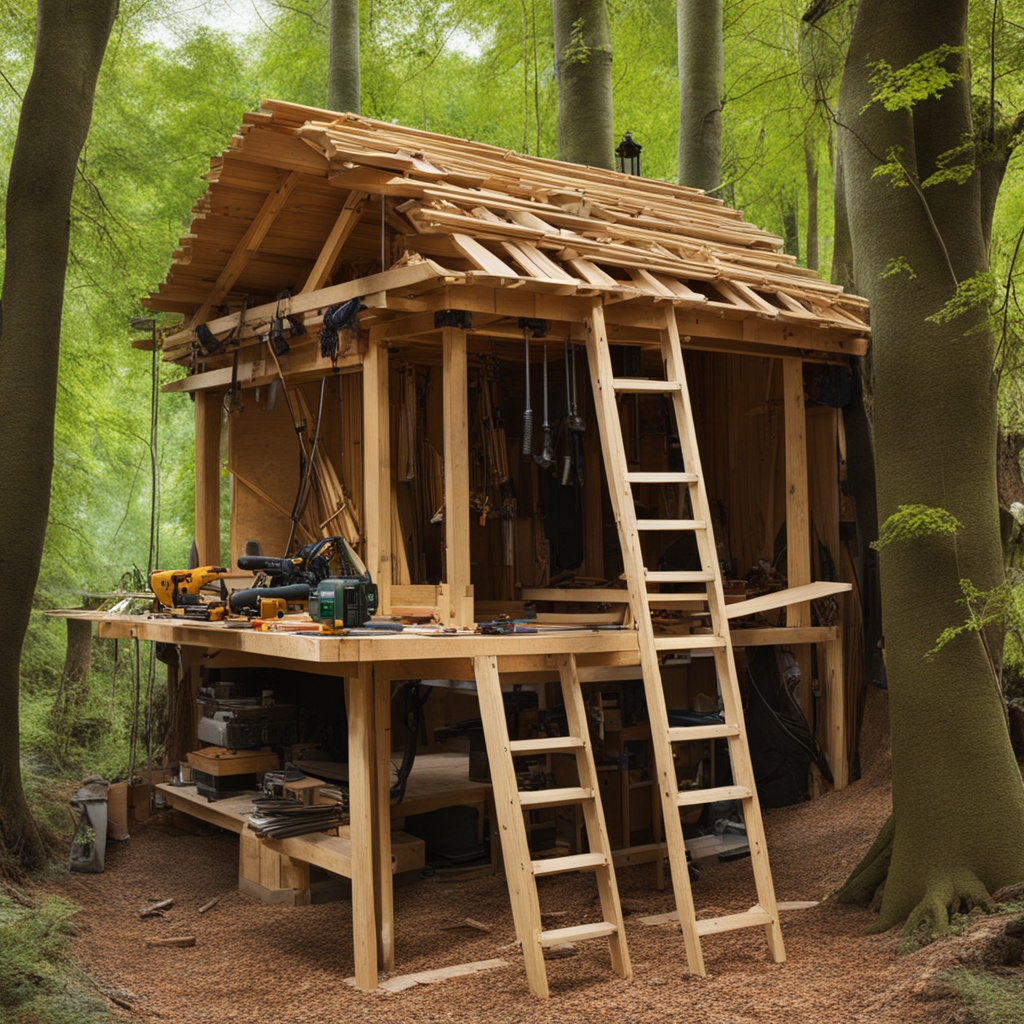
Gathering the right tools and durable, weather-resistant materials equips you to build a treehouse withstanding elements, providing countless outdoor adventures.
Crafting the Perfect Treehouse Platform
Building a sturdy and level treehouse platform lays the foundation. It’s the base for your elevated sanctuary.
Getting it right from the start is crucial. The treehouse platform sets the stage for success.
Leveling Techniques
Ensuring your treehouse platform is perfectly level is essential. Even a slight tilt can lead to problems.
Here are some tried-and-true leveling techniques:
- Use a high-quality spirit level to check evenness
- Employ shims or adjust lag bolts for fine-tuning
- Construct a sturdy base frame for uneven ground
- Double-check measurements and levels at every step
Secure Tree Attachment Methods
Secure attachment to the tree trunk ensures safety. Consider these reliable tree attachment methods:
- Lag bolts anchor deep into the heartwood
- Custom brackets can be bolted or lag-screwed
- Notching beams into the trunk provides a snug fit
- Use galvanized hardware to prevent corrosion
With a level platform and secure attachment, you’ve built a solid foundation.
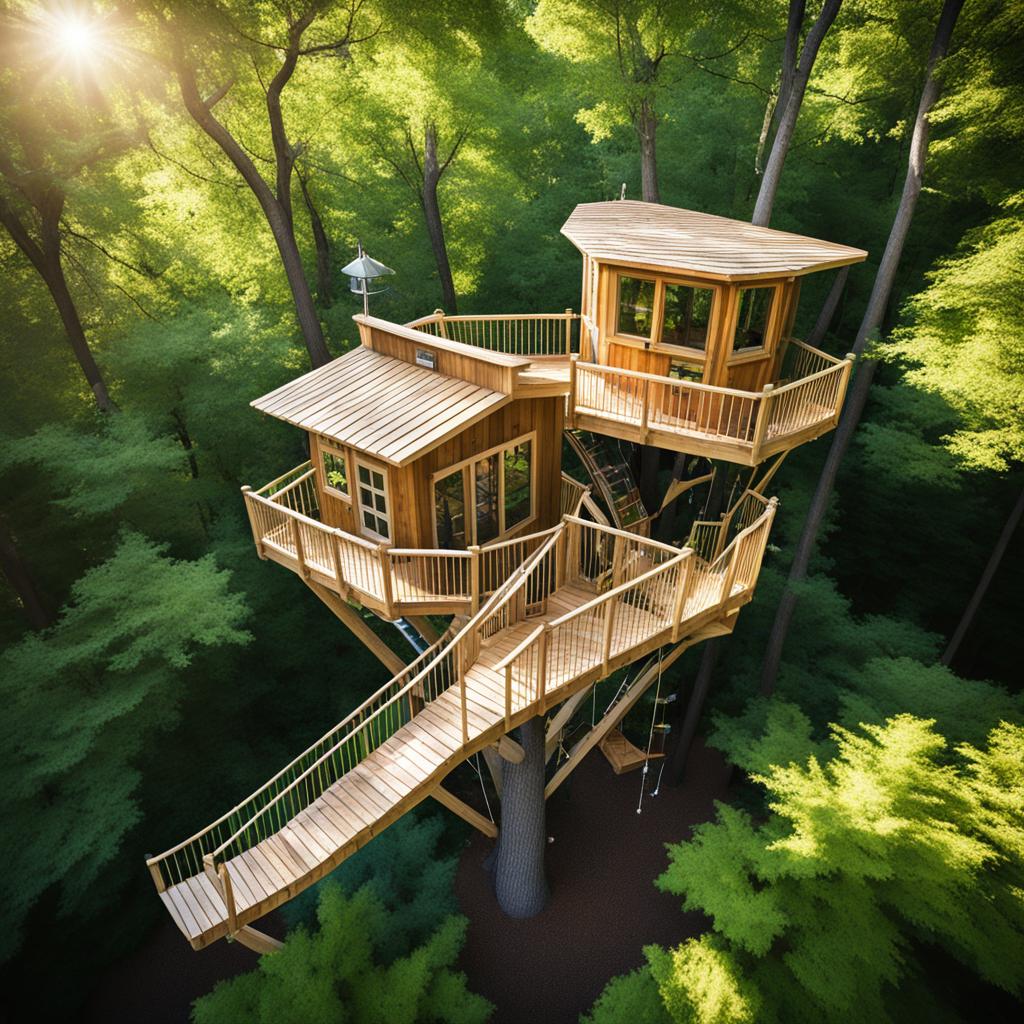
Framing, Flooring, and Roofing Your Treehouse
Creating a sturdy, weather-resistant treehouse requires careful planning. The framing, flooring, and roofing are crucial elements. These ensure your elevated hideaway withstands nature’s forces. They also provide a safe, enjoyable space for years.
Structurally Sound Framing
The treehouse’s framework is its backbone. Choosing suitable materials is vital. Cedar and redwood resist decay and insects well. This makes them durable options. Pine is more affordable but may need larger lumber. Plywood or OSB are strong, lightweight wall choices.
- Cedar: Naturally resists decay and insects, lightweight, strong
- Redwood: Resists decay, easy to stain or paint, needs special support
- Pine: Affordable, easy to work with, may require larger lumber
- Plywood: Dense and robust for walls
- OSB: Slightly less dense than plywood but very strong and lightweight
Weather-Resistant Flooring Options
The flooring must withstand the elements. It must provide a sturdy surface. Pressure-treated wood or plywood are ideal. They offer strength and weather resistance. Consider insulation for year-round coziness.
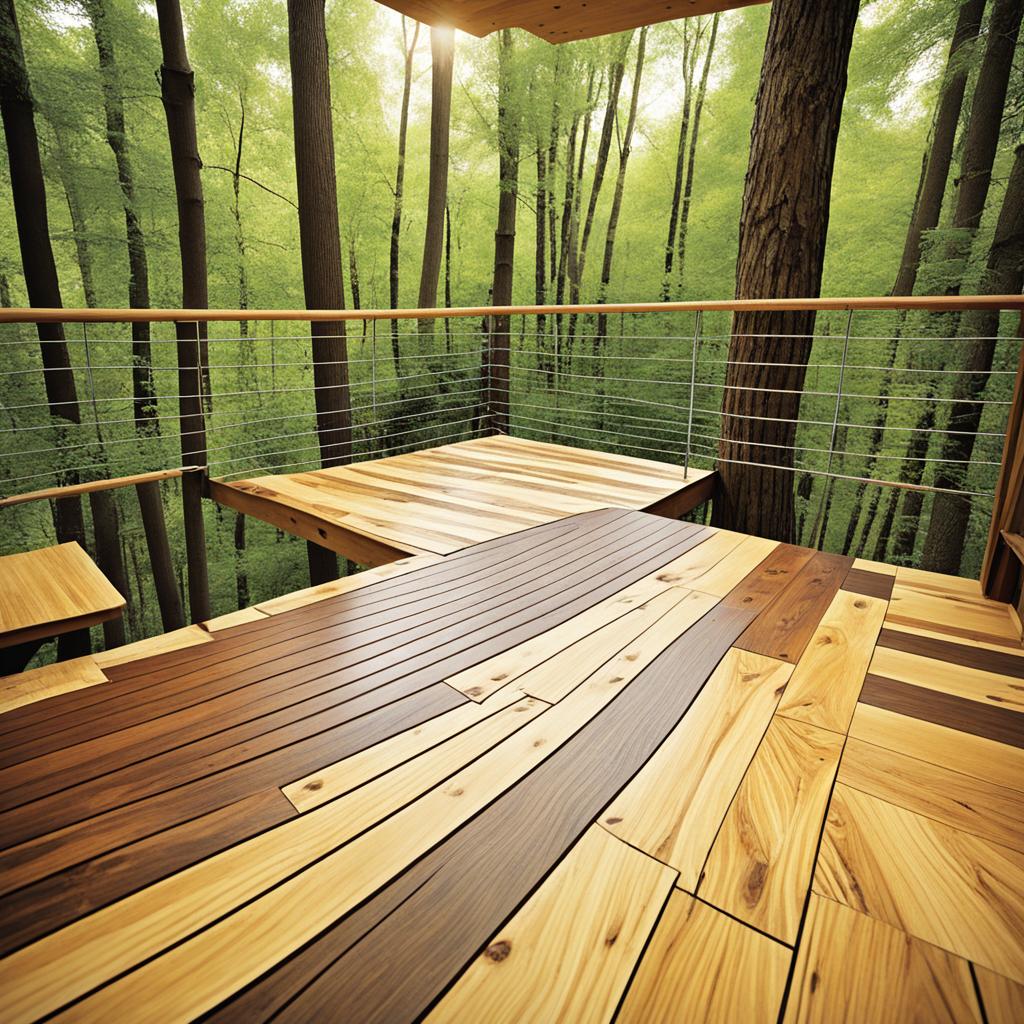
Roofing Materials for Treehouse Protection
A well-designed roof protects from rain, snow, and nature. Shingles, metal, or living roofs provide coverage. Proper sloping and drainage prevent water pooling. Materials like overlapping tin ensure a watertight seal.
| Material | Description |
|---|---|
| Shingles | Durable and long-lasting roofing option |
| Metal | Weatherproof and low-maintenance |
| Living Roofs | Eco-friendly option with vegetation |
“A well-built treehouse is a magical escape, a sanctuary where childhood dreams come alive.” – Unknown
Selecting suitable framing, flooring, and roofing creates a treehouse capturing imagination. It will stand strong, providing endless adventures and cherished memories.
Treehouse Interior Design and Decor
Creating a cozy, inviting treehouse interior balances functionality and whimsical charm. With limited space, treehouse interior design demands thoughtful planning and clever space optimization. From compact built-in furniture to smart storage solutions, incorporate scale-appropriate pieces blending form and function.
Space Optimization for Treehouses
Maximizing limited square footage is crucial. Consider multi-purpose furniture like fold-down beds or benches doubling as storage. Stack crates or baskets for stylish, practical shelving. Loft areas offer additional sleeping or lounging zones without encroaching on floor space.
- Install built-in nooks or window seats for cozy reading corners.
- Utilize vertical space with wall-mounted shelves or hanging planters.
- Opt for slim, minimalist furnishings that don’t overwhelm the room.
Lighting Solutions for Elevated Hideaways
Proper treehouse lighting illuminates your sanctuary and creates an enchanting ambiance. Get creative with twinkling fairy lights or solar-powered lanterns casting a warm, inviting glow. Position floor lamps strategically for task lighting, incorporating natural elements like driftwood or branch fixtures for rustic charm.
“Design is not just what it looks like and feels like. Design is how it works.” – Steve Jobs
When crafting your dream treehouse decor, let imagination soar. Infuse personal touches reflecting your unique style – earthy and understated or vibrant and eclectic. Adorn walls with nature-inspired art, hang macramé plant holders from exposed beams, or drape cozy throws over plush cushions.
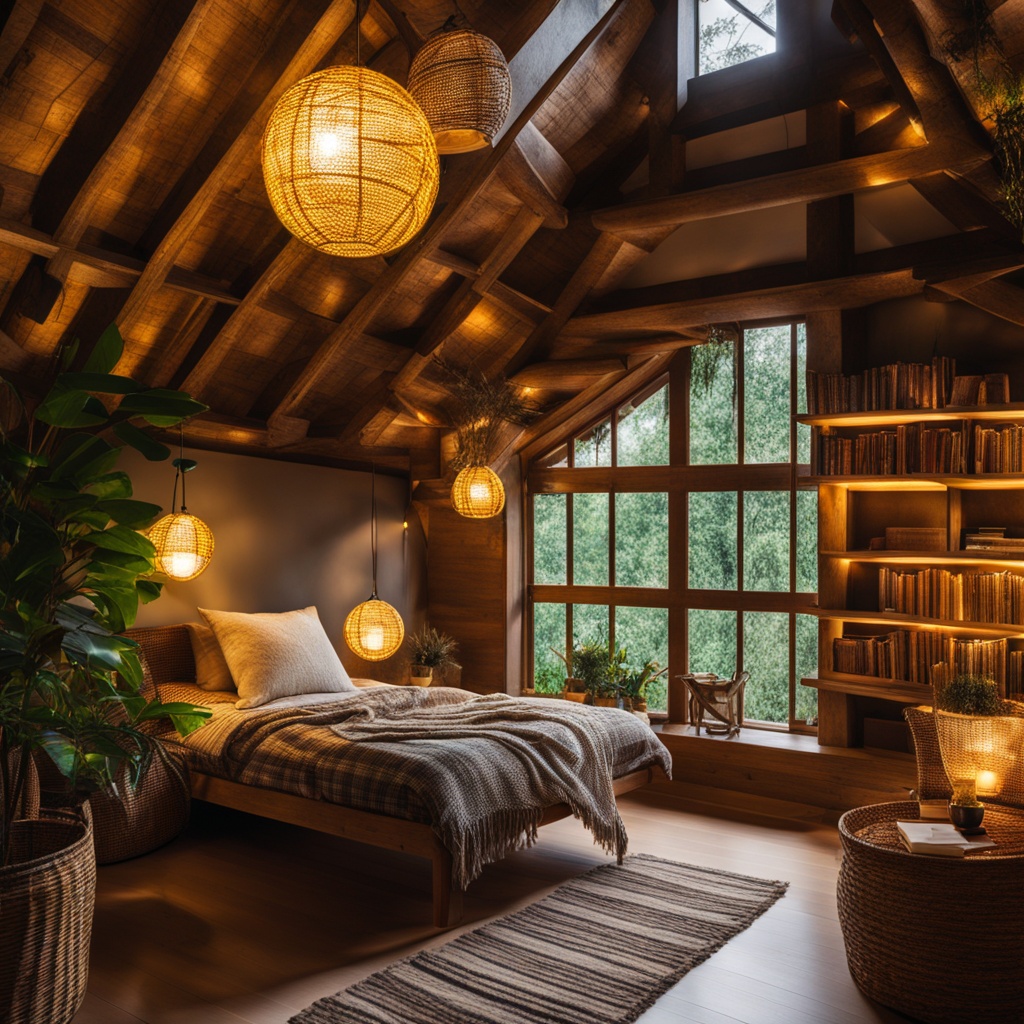
Conclusion: Maintaining Your Treehouse Masterpiece
After crafting your dream treehouse, ensuring longevity is crucial. Regularly inspect for damage, rot, or infestations. Promptly fix any issues discovered.
Refinish exterior materials periodically. This protects against weather exposure. Use tree-friendly attachment methods for growth. Dispose of waste responsibly.
Prioritizing sustainability allows your retreat to provide enjoyment. Respecting the environment preserves this sanctuary. With proper care, your masterpiece remains cherished.
For whimsical hideaways or sophisticated retreats, routine maintenance ensures enduring beauty. Sustainable practices ignite imaginations, creating lasting memories.
